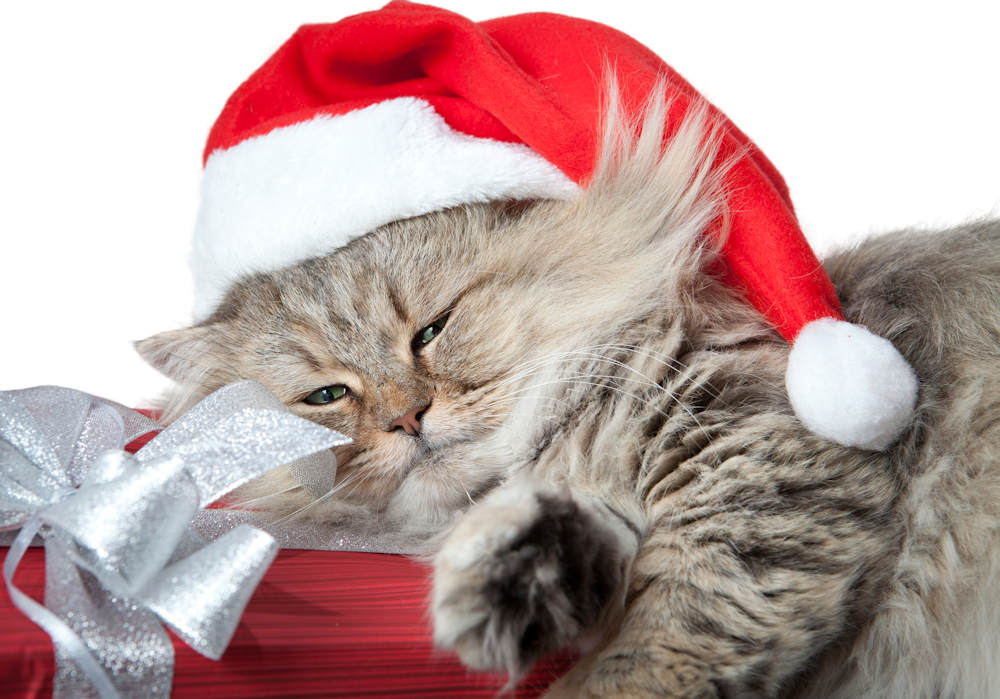Cats and Holiday Safety
It is easy to forget that some of the common items we have in and around our homes during the holidays can be dangerous to our cats and dogs.
Keep the following in mind:
Chocolate
Wrapping Paper and Ribbon
Hanging Ornaments
Christmas Lights
Poisonous Plants
The toxicity reactions from holiday plants vary from mild to extreme. The level of poisoning (illness) is also related to amount or part of the plant eaten.
Listed below are just a few toxic plants:
- Mistletoe can cause significant vomiting and diarrhea, difficulty breathing, collapse, erratic behavior, hallucinations and death when ingested. A call to your veterinarian or poison control center should be immediately made for specific advice.
- Pine tree needles can produce drooling, oral irritation, vomiting, diarrhea, lethargy, trembling and posterior weakness. Tree needles are not easily digested; possibly causing GI irritation, vomiting, gastrointestinal obstruction or puncture. Artificial trees are also dangerous when ingested as the artificial material is not digestible and can cause intestinal obstruction.
- Christmas Tree Water may also have harmful or deadly consequences for cats and dogs (and children) who drink the water! Preservatives, pesticides, fertilizers and other agents, such as aspirin, are commonly used in the Christmas tree water to keep the tree fresh.
- Lilies and Daffodils - As little as a single leaf from any lily variety is lethal to cats. The plant bulb kits featuring Amaryllis and other plants in the lily family, Narcissus and other plants in the daffodil family, are popular gift items at Christmas time and these are very toxic for cats. If ingested, the cat may show severe symptoms of gastrointestinal signs, cardiac arrhythmias, kidney failure, convulsions and death. Daffodils are toxic to both dogs and cats, especially the bulbs.
- Holly - commonly found during the Christmas season, can cause intense vomiting, diarrhea and depression. Considered to be moderately to severely toxic and the veterinarian or poison control center should immediately be contacted for specific advice.
- Poinsettias can cause irritation to the mouth and stomach and sometimes vomiting.
Click here to view the entire ASPCA list of Toxic Plants for cats.
ASPCA Animal Poison Control Center Phone Number: (888) 426-4435
Tinsel
Candles
Holiday Foods
Stress
Cats like routine and predictability, so when their schedules or environments change they can become upset. If you are planning on having holiday guests and your cat isn't used to entertaining, create a safe, quiet space away from the action where your cat can have some peace and quiet. Have food, water and a litter box available to your cat in a secluded area so your cat can be comfortable away from your gathering. If the stress of the holidays does become too much for your cat to handle, try synthetic pheromones, such as Feliway.
I have more than one Feliway diffuser around the house. Click here to purchase Feliway on Amazon.
Cats Given as Gifts
Every companion animal deserves a home where it will be wanted and well taken care of. Shelters nationwide report an increase in new arrivals right after the holidays, when people surrender the "gift pet" that they may not have wanted. Please do not give a cat to someone as a gift.
Travel Dangers
If you are traveling with your cat during the holidays, be sure that your cat is properly secured in a carrier and that it has adequate identification, including a microchip. That way if you get separated your cat has a way to be reunited with you. Prior to leaving home get contact information for a veterinarian or an emergency veterinarian in the area you are visiting, so that if your cat gets injured or becomes ill you know where to go to get your cat the care and attention it requires.
If you have festive plants make sure they are somewhere your cat won't be tempted to chew on them. If you are unsure if a plant is poisonous, or are concerned that your cat may have eaten something dangerous, call your veterinarian or the ASPCA's animal poison control center (888-426-4435) for more information.
Enjoy the holiday season with your cat and, as always, if you have questions or concerns, contact your veterinarian. They are your best resource for information about your feline friend.

Cat in Santa Hat - © Adobe Stock
